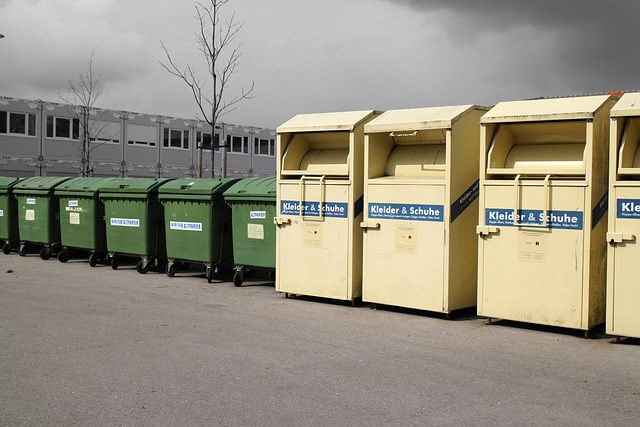Boston-NY E-Waste Recycling: Navigating Cross-State Challenges for Environmental Benefits
In New York City and Boston, rapid digital transformation has led to a surge in electronic waste (e-waste). Both cities are actively addressing this c…….
In the rapidly evolving digital age, the management of electronic waste, or e-waste, has emerged as a critical global challenge. “Boston NY e-waste recycling” represents a pioneering approach to tackling this pressing issue, offering sustainable solutions for disposing of and repurposing electronic devices. This article delves into the intricacies of this innovative practice, exploring its impact, mechanisms, and future potential. Readers will gain insights into the complex world of e-waste management, understanding why Boston NY’s efforts are not just environmentally beneficial but also economically promising.
Definition: Boston NY e-waste recycling is a comprehensive program designed to collect, sort, and recycle electronic waste generated in the Boston and New York City regions. It involves a multi-step process that includes collection events, facility-based processing, and responsible disposal or repurposing of e-waste materials.
Core Components:
Collection: The program organizes regular drop-off events where residents can bring their obsolete electronics, such as computers, phones, TVs, and small appliances. These events are often held at local community centers or schools to ensure easy access for all.
Sorting and Categorization: At the recycling facility, e-waste is meticulously sorted based on material type and device category. This step ensures that different electronic components can be processed and recycled appropriately.
Disassembly and Processing: Skilled technicians disassemble complex devices, separating valuable materials like gold, silver, copper, and plastics. Advanced technologies are employed to extract these resources efficiently while minimizing environmental impact.
Recycling and Repurposing: The extracted materials undergo further processing to meet industry standards. Some components may be reused or refurbished, extending the lifespan of electronic devices and reducing the demand for new production.
Historical Context: The concept of e-waste recycling has evolved over several decades as technology advanced and the volume of electronic waste grew exponentially. Boston NY’s initiative built upon successful local recycling programs and international agreements like the Basel Convention (1989), which aims to control the transboundary movement of hazardous wastes, including e-waste.
Boston NY e-waste recycling is not an isolated practice; it reflects a global trend towards more responsible electronic waste management. Here’s how it fits into this international context:
| Region | E-Waste Recycling Initiatives | Notable Successes |
|---|---|---|
| North America | Many US cities, including Boston and New York, have implemented e-waste recycling programs, often facilitated by government agencies or non-profit organizations. | California’s electronic waste program has achieved high collection rates, setting a benchmark for other states. |
| Europe | The EU has led the way with stringent e-waste legislation, encouraging manufacturers to take back and recycle products. | Germany’s comprehensive system has resulted in high recycling rates and a robust secondary raw materials market. |
| Asia | China, as a major electronics manufacturer, has faced scrutiny for improper e-waste disposal but is now focusing on formalizing its recycling infrastructure. | South Korea’s e-waste management system is renowned for its efficiency, employing advanced technologies to recover valuable materials. |
These global trends indicate a growing recognition of the environmental and economic implications of unchecked e-waste accumulation. Boston NY’s efforts contribute to this global movement by establishing a robust framework for local e-waste recycling.
The economic aspects of Boston NY e-waste recycling are multifaceted, impacting various sectors:
Market Dynamics: The program creates a sustainable market for recycled materials, which can be sold to manufacturers for reprocessing into new products. This circular economy approach reduces the need for virgin resources and lowers production costs.
Investment Opportunities: Recycling facilities require significant initial investment but offer long-term returns. Businesses investing in these projects can benefit from tax incentives and positive environmental reputation.
Employment Generation: The e-waste recycling sector creates jobs, ranging from collection team members to skilled technicians. This contributes to local employment and economic growth.
Cost Savings for Manufacturers: By utilizing recycled materials, electronics manufacturers can reduce their reliance on raw material procurement, leading to cost savings and a more sustainable supply chain.
Technological innovations play a pivotal role in enhancing Boston NY e-waste recycling’s efficiency:
Automated Sorting Machines: Advanced sorting technologies use computer vision and AI algorithms to identify and separate electronic components with high accuracy, reducing manual labor requirements.
Hydrometalurgy and Pyrometallurgy: These processes enable the efficient extraction of precious metals like gold and silver from e-waste using water-based or heat-based methods, respectively.
Waste-to-Energy Systems: Some facilities are exploring ways to convert non-recyclable e-waste into energy, providing an additional revenue stream and reducing environmental impact.
Internet of Things (IoT) for Tracking: IoT devices can be embedded in electronic products to track their journey from manufacture to recycling, ensuring proper disposal and data security.
Governing bodies play a crucial role in shaping Boston NY e-waste recycling’s landscape through policies and regulations:
Basel Convention (1989): This international treaty restricts the export of hazardous wastes, including e-waste, from developed to developing countries, promoting safer disposal practices.
US Environmental Protection Agency (EPA) Regulations: The EPA sets guidelines for managing electronic waste, encouraging recycling and prohibiting certain hazardous materials in electronics.
New York State Electronic Waste Management Act: This law mandates the collection and recycling of e-waste from households and businesses, providing a legal framework for Boston NY’s initiative.
Local Ordinances: Cities within Boston NY have passed ordinances requiring electronic device manufacturers to take back and recycle their products, fostering collaboration with the recycling program.
Despite its many benefits, Boston NY e-waste recycling faces challenges that require strategic solutions:
Collection Coverage: Ensuring comprehensive collection across diverse communities is a challenge, especially in suburban or rural areas. Expanding collection networks and raising awareness can address this issue.
Funding and Resource Allocation: Initial investment and ongoing operational costs can be significant. Public-private partnerships and government subsidies are crucial for sustaining these programs.
Counterfeiting and Data Security: The illegal trafficking of e-waste and the potential theft of sensitive data from devices are valid concerns. Stricter enforcement and secure recycling practices are necessary to mitigate these risks.
Public Awareness: Educating residents about the importance of proper e-waste disposal remains a continuous task. Public awareness campaigns can play a vital role in encouraging participation.
Several case studies highlight the successful integration of Boston NY-style e-waste recycling:
New York City’s E-Waste Program (2017): The city launched a pilot program in collaboration with local non-profits, achieving impressive results. They collected over 350,000 pounds of e-waste in the first year, diverting it from landfills.
Boston’s “Recycle My Electronics” Event (2018): A one-day collection event at a local sports arena saw over 600 people bring their old electronics. The program successfully recycled 40 tons of e-waste and raised awareness among residents.
The Green Cycle, New York (Ongoing): This private recycling company partners with businesses across NYC to collect and recycle e-waste responsibly. Their data-driven approach ensures secure data destruction, gaining trust among clients.
The future of Boston NY e-waste recycling looks promising, with several emerging trends and growth areas:
Expansion of Collection Services: With increasing awareness, there will be a growing demand for convenient e-waste collection options, including home pickup services and more frequent community events.
Zero Waste to Landfill Goals: Boston NY and other cities are setting ambitious targets to achieve zero electronic waste in landfills by 2030, fostering innovation and collaboration across sectors.
International Collaboration: Global partnerships can lead to the sharing of best practices, technologies, and resources, accelerating progress in e-waste management.
Integration with Smart Cities: Boston NY’s recycling program can benefit from smart city initiatives, utilizing IoT sensors for real-time monitoring and optimizing collection routes.
Boston NY e-waste recycling represents a comprehensive and sustainable approach to managing electronic waste, offering a model for cities worldwide. Through its multi-faceted strategy, it not only addresses environmental concerns but also drives economic growth and fosters innovation. As the world navigates the digital transformation, initiatives like these are essential in shaping a greener and more prosperous future.
Q: How does Boston NY ensure the proper disposal of hazardous materials in e-waste?
A: The program follows strict regulations and works with certified recycling facilities that adhere to environmental standards. Hazardous materials are handled and disposed of according to international guidelines, ensuring safety and minimal impact on the environment.
Q: Can individuals earn money by recycling their old electronics through this program?
A: While Boston NY’s primary focus is on responsible disposal, some recycling centers or manufacturers may offer incentives or trade-ins for certain devices, allowing individuals to benefit from recycling efforts.
Q: How does the e-waste recycling process impact local communities?
A: The program creates job opportunities, contributes to local economic growth, and raises awareness about environmental sustainability. Community engagement in collection events also fosters a sense of shared responsibility for a cleaner, greener future.
Q: What happens to the recycled materials? Are they used to make new products?
A: Recycled materials are processed and refinished to meet industry standards. They can be used to manufacture new electronics, reducing the demand for virgin resources and contributing to a circular economy.
Q: Is there any risk of data breaches when recycling electronic devices?
A: Data security is a priority in e-waste recycling. Reputable facilities employ secure methods to erase or destroy data from devices, minimizing risks associated with data breaches.

In New York City and Boston, rapid digital transformation has led to a surge in electronic waste (e-waste). Both cities are actively addressing this c…….

Boston is enhancing its environmental sustainability through robust e-waste management initiatives, modeled after successful programs in cities like N…….